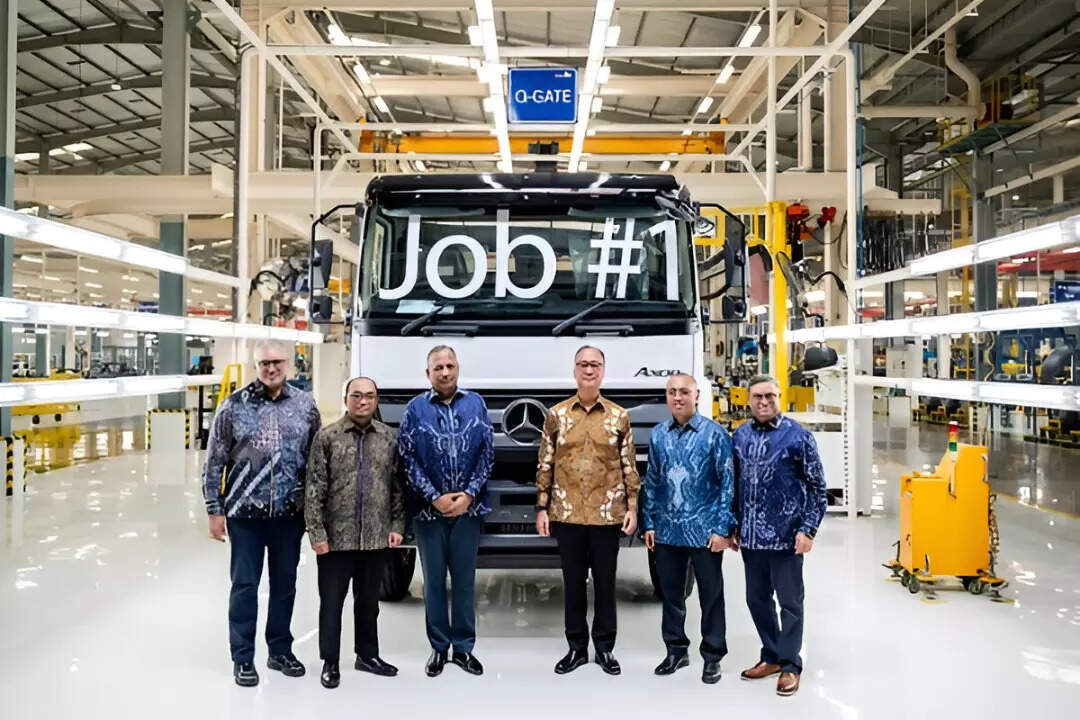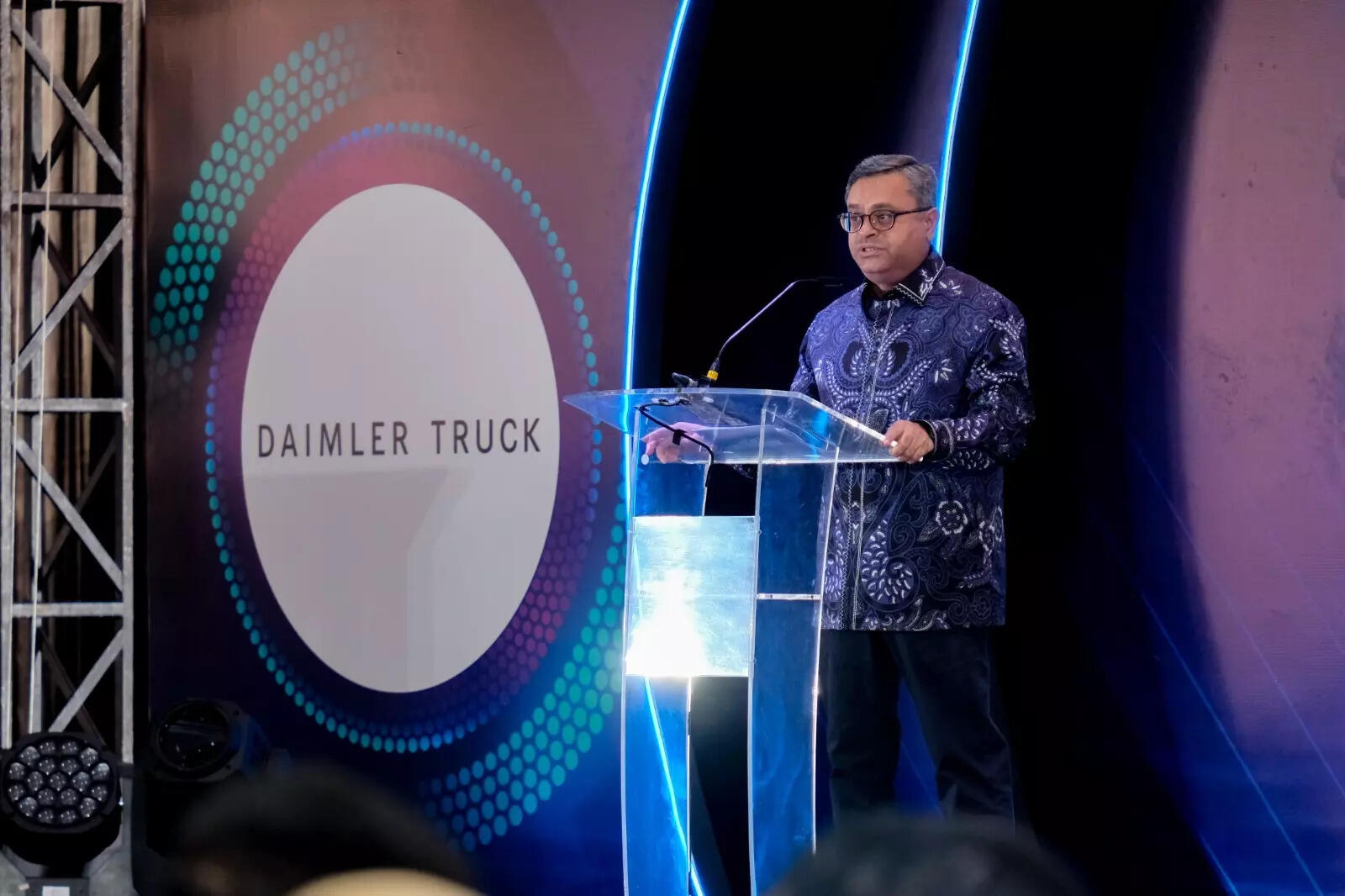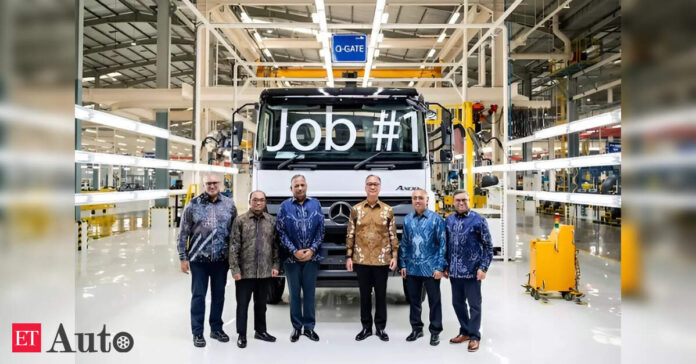Daimler India Commercial Vehicles played a key role in helping set up the new Mercedes-Benz trucks and buses plant near Jakarta. A feasibility study is now on to see if this facility can double up as a hub to cater to other parts of ASEAN.
Highlights
- Daimler India aids setup of new Mercedes-Benz truck plant in Indonesia to expand ASEAN footprint.
- Mitsubishi Fuso and Hino Motors merge to consolidate Japan’s CV industry and counter China.
- New Indonesia facility boosts production efficiency and strengthens India’s export role.
 Daimler Truck’s plant in Indonesia on June 10 marks the beginning of a new chapter for its ASEAN business where the India operations will play a key role.
Daimler Truck’s plant in Indonesia on June 10 marks the beginning of a new chapter for its ASEAN business where the India operations will play a key role.
“By setting up this plant, we will capture more volumes here and this will help India which sends completely knocked down kits to Indonesia. Both plants can supplement each other and market growth here will boost India’s shipments,” said Satyakam Arya, Managing Director & CEO of Daimler India Commercial Vehicles (DICV).
He was speaking to a select group of Indian journalists who had been invited by the company to be part of the inauguration ceremony for this new plant in the Cikarang Industrial Area, West Java, near Jakarta.
According to Arya, a feasibility study was underway to see if Indonesia could become a hub for Daimler Truck across ASEAN. “There are different free trade agreements in place and we need to look at the best opportunity. We can leverage the pacts Indonesia has with various markets and supplies can be contemplated from here. The feasibility study is still on in terms of markets and volumes,” he elaborated.
There are different free trade agreements in place and we need to look at the best opportunity. We can leverage the pacts Indonesia has with various markets and supplies can be contemplated from hereSatyakam Arya

Quick commissioning
The facility was commissioned in 12 months and trial production has been done for 150 units with the stage now set for commercial sales. “We were happy that we could pull it off quickly thanks to robust planning. The team was very agile and able to change course quickly whenever they encountered a problem. They met the deadline and this can only be done with groups working together with a common goal,” he said.
Processes here are much faster and way more flexible compared to the old plant. Without an efficient layout in place, continued Arya, the distance travelled for a kit from the start of assembly line was 16 kilometres in the old facility compared to just 0.8 km in the new one.
“We needed to be leaner, more flexible and cost-competitive which was why we commissioned this new plant. It is way more efficient and increases throughput. The intent was to modernise and have a more efficient layout,” he said.
DICV also had experts from Chennai stationed here and flying in during the last 15 months. They shared their competencies in manufacturing, quality and supply chain which was then put to good use in Indonesia. “Swapping knowledge is part of the ethos at Daimler Truck,” added Arya.
Also read: How in-house software development will drive Daimler Trucks future success
Learning from each other
For instance, when it comes to inversion of the CV frame, it needs to be turned upside down for parts assembly and then set right again for fitting the cabin and powertrain. “The speed with which they do it here in Indonesia is different from what we did in the past and hence there is an opportunity to always learn,” he said.
The Indonesian auto market was traditionally developed by Japanese brands which continue to dominate across two-wheelers, passenger cars and commercial vehicles. Despite this, there is a “separate segment of people” who like Mercedes-Benz and perceive it as a brand which is well known, aspirational and confers pride of ownership.
At the beginning of this year, Daimler Truck merged its businesses in China and India with Mercedes-Benz Trucks. According to the top management, this move would allow the newly formed segment to unlock its full potential through scale and efficiency in terms of technology as well as production. It would also serve customers across five continents in “a cohesive manner with a truly global offering while remaining a reliable, close partner in the regions”.
Arya echoed these sentiments at the roundtable. “Our entire business in Europe, Latin America has now added India and China all these regions have the same Mercedes-Benz product DNA. We believe this will give us a lot of scale and efficiency because we have production footprints in different geographies,” he said.
Also Read: Daimler Truck introduces new manufacturing facility in Indonesia
Greater flexibility
Cost-competitive locations like India and China in tandem with Latin America and Europe would ideally give Daimler Truck the opportunity to address different market segments with premium and value products. “It also gives us the flexibility to move production and opportunity for scale and technology,” added Arya.
The DICV chief was categorical that the light truck segment was one where” we cannot make a difference and there is no point getting in” largely because it is very cost-sensitive even though volumes are tempting. “Our DNA is different and we will stay true to this space (of M/HCVs),” he said.
As for new fuel options, he made it clear that there was no point bringing “half-baked” options to India. “We have looked at technologies worldwide and have done limited trials of fuel cells in the intercity coach. We are looking at the market and pace of infrastructure development before we take a decision,” said Arya.
Right now, prior to contemplating options for long haul trucks, the company is more likely to have electric trucks in enclosed environment/operations like mining. Breakeven can also be achieved even faster in such activities rather than long haul transfers.
Fuso, Hino merger
The day of the media roundtable, June 10, also brought in news of the long awaited merger of Mitsubishi Fuso, part of the Daimler Truck fold, and Hino Motors, a group company of Toyota. This has been work in progress since 2023 (Volkswagen Truck was earlier in talks with Hino) and it is only now that the merger has received the go-ahead.
As Hino has articulated in its statement, the idea is to be an essential force for transformation in the world and promote the use of environmentally friendly vehicles while increasing the value of mobility in global social systems.
“Commercial vehicles, which support our daily lives by moving people and goods, are an important form of mobility that can be considered a form of social infrastructure. To create a prosperous mobility society through the use of commercial vehicles, we must solve pending challenges, such as how to achieve carbon neutrality and more efficient logistics. Doing so will require significant investment,” said Hino.
Japanese consolidation
Beyond this is the reality that the number of commercial vehicles is smaller than that of passenger cars and it becomes “extremely difficult” for each of Japan’s commercial vehicle manufacturers to respond to the domestic market on their own.
“To protect the automotive industry and jobs in Japan and Asia, we must increase our competitiveness by improving our operational efficiencies in development and production,” continued the Hino Motors statement.
By joining forces, the goal is to enhance the competitiveness of Japanese truck manufacturers, helping to strengthen the foundation of the Japanese and Asian automotive industries. “In this way, the integrated company aims to make a meaningful and lasting contribution to society and stakeholders,” it declared. By the end of the day, it will also keep the Chinese truck makers at bay.
Join the community of 2M+ industry professionals.
Subscribe to Newsletter to get latest insights & analysis in your inbox.
All about ETAuto industry right on your smartphone!
- Download the ETAuto App and get the Realtime updates and Save your favourite articles.




